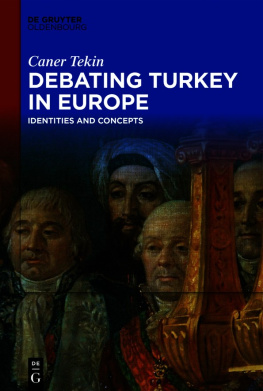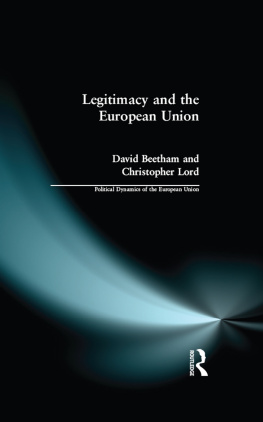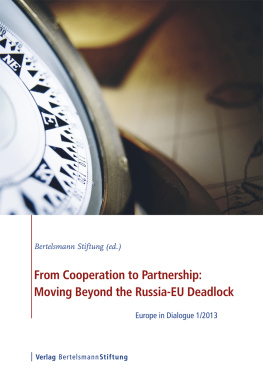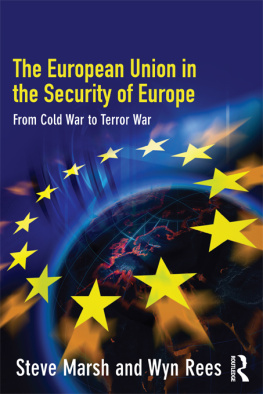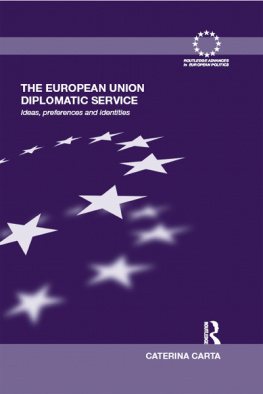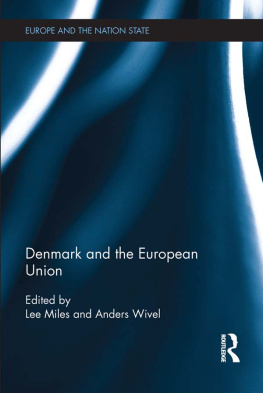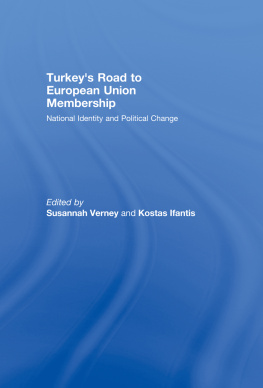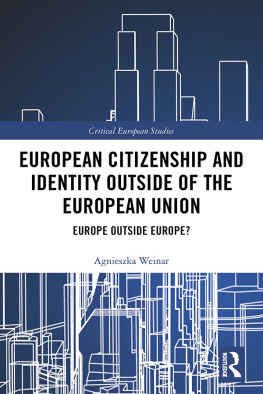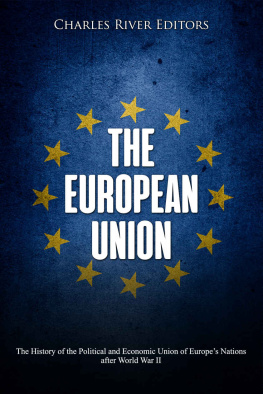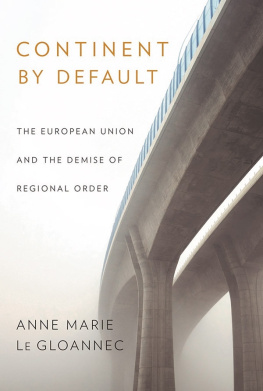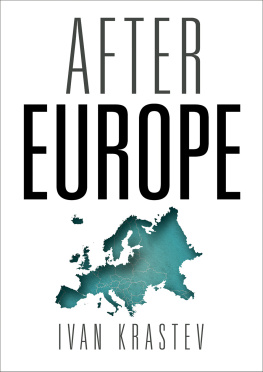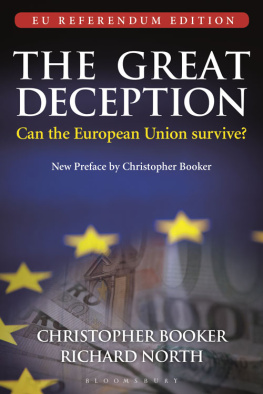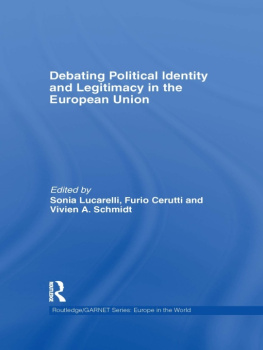Preface and Acknowledgments
The prominent British sociologist Gerard Delanty commented about European identity in 1995: The discourse of Europe is ambivalent in that it is not always about unity and inclusion, but is also about exclusion and the construction of difference based on norms of exclusion. Europe, even in its most hopeful times for peace and integration, remained a nebulous concept instrumentalised by the sides of power politics in relation to what they see as other. The nation-states of Western Europe after the Second World War had found the occasion to blow this haze with a new integration project. Based on undecided European geography in the East, the EU materialised its political meaning in time in an attempt to define, with the yardstick of the accession criteria, what is European and what is not in peaceful and democratic terms.
The EUs uneasy relationships with Turkey evolved throughout the association and candidature phases bear significance concerning which binaries emerged in defining European and non-European despite the accession criterias leverage. If one factor structuring Turkeys accession process is some democratic criteria, the other has inherently been the interests shaped in national politics, and the preoccupations with religion, welfare, and migration almost always led the contestations over Turkeys EU bid. Furthermore, particularly for conservative camps of continental Europe the conflictual history of the Ottoman Empire has so far become a weapon with which to question Turkeys compatibility with Europe. In brief, the way the EU comes to terms with Turkeys accession bid reveals how contested Europe as a concept is. Europe is a notion into which nation-states and their political camps fit their own stories. Although Turkeys accession to the EU is a far-fetched prospect today, contemporary history reveals the stakes involved in the understandings of the co-existence between Europe and Turkey.
With these questions in mind, I undertook my doctoral research at the Ruhr-University Bochum between 2013 and 2017, which originated the present book. The trajectories of the transforming relationships between Turkey and Europe are the subject of history, but the final period of Turkeys candidature is addressed by various disciplines. At the intersection between history, politics and international relations, the book has conceptual and methodological shortcomings that are entirely of my own doing.
A number of people helped me in this book with their intellectual breadth and motivations. I am first and foremost grateful to my very dear friend Stefan Berger, my first supervisor, who raised me to my current academic maturity with great concern. I owe him a debt of gratitude for his company and, most importantly, for his patience. Professor Markus Koller lent his support in the second and third chapters, and I am thankful to him specifically for his support for my post-doctoral activities. Seda Gurkan read and improved the first draft with her critics. Fazit Stiftung, foundation of Frankfurter Allgemeine Zeitung, accepted to fund the printing costs. As earlier models of inspiration, Professor Corinne Gobin and Professor Canan Balkir, with whom I had the chance to work in Brussels and Izmir, believed in me and helped me reach my early academic network. During my adventures in Brussels and Bochum, two very special people emerged on my path and touched my life. Especially during my early struggle with the obstacles of my research, Jasmina became a confidant and tutor bringing me up in social life and helping me hold onto my aspiration. Finally, but most importantly, I am indebted to my partner Isabel for her faith in me, as she never gave up on me even in my most discouraging moments and was the real strength of endurance throughout the entire process.
To close this section, the books cover demands explanation, as it is relevant for Turkeys controversial position central to European debates over being a partner, aggressor, and sick man. Commissioned by Napoleon Bonaparte, Jacques-Louis David painted his famous coronation and represented the participants of the ceremony held in the Notre Dame Cathedral of Paris in 1804. The present cover image is a detail of this renowned painting and features Halet Efendi, Ottoman ambassador in the Napoleonic age, as standing in the corner and watching the coronation behind the vast crowd. Such a detail draws questions regarding whether the spot reserved for an Ottoman diplomat mirrored the long-term place of Turkey in Europe. In any case, Halet Efendi had been given an insignificant position in the event despite relatively improving relations with France since Napoleon waged his unsuccessful invasion in Egypt 10 years ago, an offensive that expanded the orientalist literature about the Ottoman realm. From the turn of the 19th century onwards the image of the Turk saw its long evolution, with which this book deals in depth.
Introduction and Conceptual Clarifications
Europe has been, and still is, home to many societies. It is a common roof, but one lacking a commonly accepted definition. The disagreements over what Europe is and which values define Europeanness emerged extraordinarily in the 2000s, as Turkey, which had been perceived to be Europes antithesis for many centuries, was now knocking the EUs door as a candidate for membership. In 2005, at a time when the accession talks between Ankara and Brussels were finally commencing, essentially different understandings of Europe and its past were clashing in a political debate about Turkeys EU bid. Although today the future of the accession talks is unknown, and the notion of an authoritarian Turkey having a place in Europe is perceived to be far-fetched, these early years still bear importance, since they reveal many dichotomies over European identity in European and national politics. Building on this standpoint, the present book examines the link between historical conceptions of Europe and the contestations over the definition of Turkey in relation to the European Union (or vice versa) in the 2000s.
During the 2000s, the understanding of Europe and its common values was at the centre of political debates surrounding EU enlargements. The EUs bureaucrats were depicting the organization as the strongest representative of common liberal values, and they were presenting its enlargements ahead as part and parcel of a civilizational mission of promoting these values outside, a historical mission inherited to the contemporary Europe. European values became a piece of EU legislation (Acquis communautaire) as the Treaty on European Union (amended by the Treaty of Lisbon in 2009) employed this term often in order to refer to the EUs shared democratic rights, freedoms, and principles. The question between European political camps yet remained whether these formal values of the European Union represented the whole European identity for these camps, parties and actors represented at European and national levels. This is still a relevant issue today, since the contemporary conceptions of common values are questioned not only in the case of Turkeys compatibility with Europe, but also concerning how the Central and Eastern European countries conform to the EU.

